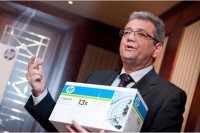Leobert Faessler told Digital Imaging that “not all clone cartridges are necessarily patent infringing”; there is “no cooperation” with remanufacturers due to “competition law”; and that the company “does not develop ‘killer chips’”.
Digital Imaging interviewed Faessler, HP EMEA’s Marketing Programme Manager, in its 5-2014 issue, and questioned him on a wide range of topics corresponding to clone cartridges, OEM patent infringement cases, cooperation with the aftermarket, so-called “killer chips” and MPS, whilst Faessler also shed light on how HP and Canon communicate regarding IP cases.
He states that “there is an exchange” between the two OEMs, whereby information is traded, but “on competition grounds, we should not work more closely together on this issue”, and he noted that “we obtained the information about the two patent lawsuits [against KMP and wta in May] on the same day as the press”.
One interesting response to Digital Imaging’s questions about clone cartridges “flood[ing]” the European market saw Faessler state that “not all clone cartridges are necessarily patent infringing. Currently, there is a high probability that a one-to-one new-built (or clone) cartridges might infringe patents”.
He said that HP “regret[s] it explicitly” that more has not been done to stop the flow of clones to Europe, though “not everything that a printer manufacturer undertakes, he also does publicly. Attempts are often made between parties to achieve an amicable settlement. The aim is not to pillory someone”. On the subject of cooperation and working with ETIRA against clones, Faessler states that “there is a regular exchange, but no cooperation”, as “that would also be problematic from the perspective of competition law”.
Questioned further on HP patents being designed to catch infringers, he stated that “we do not build replica hurdles in our supplies” to catch out remanufacturers, extending this point by noting that “our smart chips serve only one purpose: the interplay with the printer through precise level indication, to enable and improve the print result. HP does not develop “killer chips”, as some have falsely claimed”.
Faessler noted that HP is concerned “that the remanufacturing industry might get broken, because we much more appreciate a fair competitor rather than anyone selling clones from Asia”, but denies that HP has anything to do with patenting the remanufacturing process, because “we do not even remanufacture […] such process patents are currently not a topic”.
On MPS, Faessler states that “one cannot impose its business model on a customer”, and “traders want satisfied customers”, with “indirect costs such as the hardware service […] not to be underestimated, because original HP cartridges have demonstrably less technical disturbances as remanufactured products”.
Pressed on the technical tests he mentions, Faessler says HP interviewed service technicians about their experiences “with original HP compared to non-HP cartridges”, with the study finding non-HP cartridges “led to significantly more service call leads”, and also “frequently demand replacement of the parts of the printer that wear out”.
As a final point, he states that HP’s perspective on reuse is that “the raw materials of empty cartridges should be used for other products”, supporting this with another study – this time on life-cycle assessment – which “clearly showed that the CO2 footprint of remanufactured cartridges was worse on average by 11 percent as for HP cartridges”.

